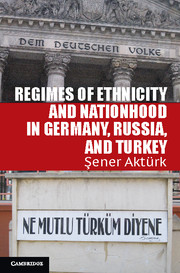Book contents
- Frontmatter
- Contents
- List of Tables, Figures, Graphs, and Maps
- List of Abbreviations
- Acknowledgments
- Part I Theoretical Framework and Empirical Overview
- Part II Germany
- Part III Turkey
- Part IV Soviet Union and The Russian Federation
- 6 The Nation That Wasn't There?
- 7 Ethnic Diversity and State Building in Post-Soviet Russia
- Part V Conclusion
- Bibliography
- Index
- References
7 - Ethnic Diversity and State Building in Post-Soviet Russia
Removal of Ethnicity from the Internal Passport and Its Aftermath, 1992–2008
Published online by Cambridge University Press: 18 December 2014
- Frontmatter
- Contents
- List of Tables, Figures, Graphs, and Maps
- List of Abbreviations
- Acknowledgments
- Part I Theoretical Framework and Empirical Overview
- Part II Germany
- Part III Turkey
- Part IV Soviet Union and The Russian Federation
- 6 The Nation That Wasn't There?
- 7 Ethnic Diversity and State Building in Post-Soviet Russia
- Part V Conclusion
- Bibliography
- Index
- References
Summary
[I]t's absolutely clear that there should be no “nationality” line in the Russian passport. If the authorities give in on this matter, Russia will spend another 30 or 40 years trying to build a state, and the outcome will be uncertain.
[T]he passport's lack of a line for “nationality” is “the biggest provocation in the history of Russia” and is aimed at destroying accord between nationalities in the country.
Soviet citizens were required to have their ethnicity in their internal passports since 1932. “Passport ethnicity” was considered one of the “three aspects of the structure and functioning of the neo-Stalinist state” in ethnic relations, whereby “internal passports [were] used by the regime in order to maintain almost impassable boundaries between nationalities.” Discussions to remove ethnicity from the internal passport under Khrushchev, Brezhnev, and Gorbachev did not culminate in a tangible change. Moreover, of the fifteen post-Soviet states, only Ukraine, Belarus, and Russia removed ethnicity from the internal passport, demonstrating the power of inertia and the strength of a primordialist understanding of individual ethnic identity as inherited, natural, and unchangeable. Ethnicity was removed from the internal passports with an executive decree issued by President Yeltsin on March 13, 1997, despite protests in many ethnic republics. How did such a momentous reform occur?
Passport reform was a decisive break with a deeply entrenched Soviet legacy in approaching ethnic diversity through recording and institutionalizing ethnic background at every level of state-society relations, starting with the very individual in his or her internal passport. The legacy of passport ethnicity is most significant in that it was the microfoundation of a most extreme form of institutionalized multiethnic nationhood that different scholars variously described as an “affirmative action empire” and a “communal apartment.” This is why the removal of ethnicity from the internal passport evoked such passions on both sides of the controversy, motivating some Tatar representatives to allege that a “genocide” was being committed by Moscow against ethnic minorities through passport reform, while the defendants of the reform were convinced that post-Soviet Russian state building hinged on the success of passport reform.
- Type
- Chapter
- Information
- Publisher: Cambridge University PressPrint publication year: 2012

